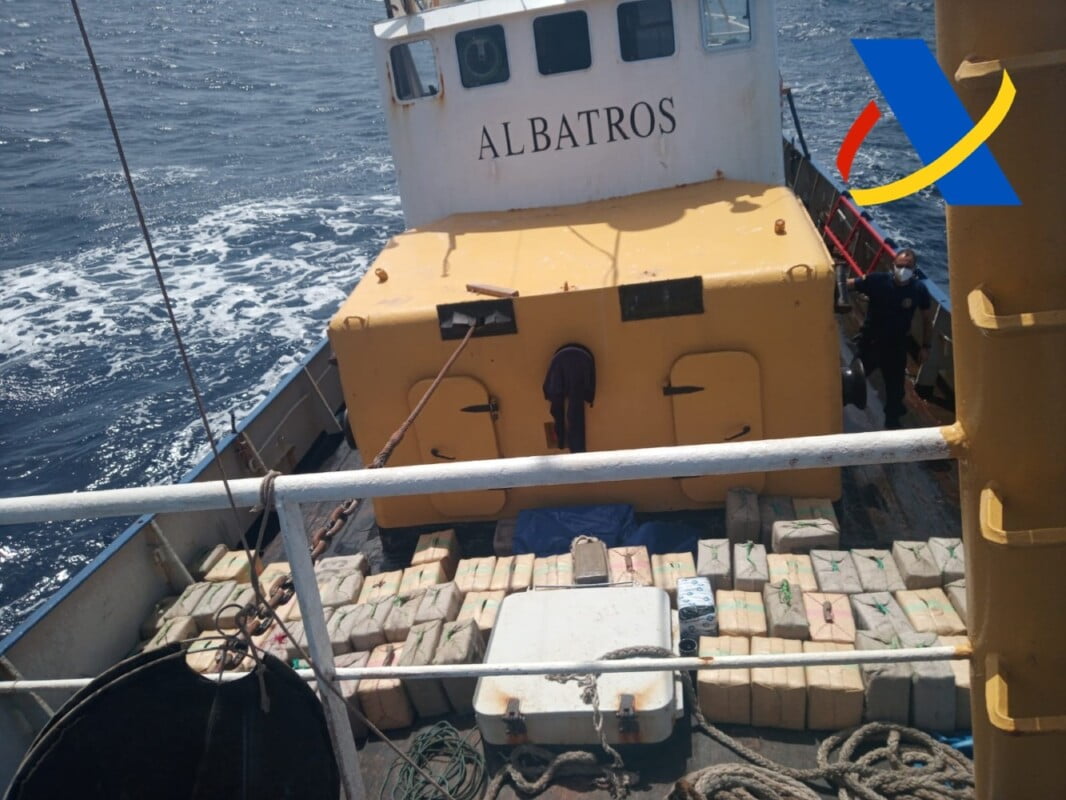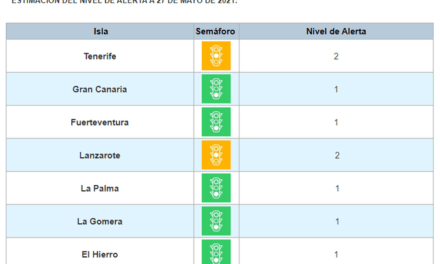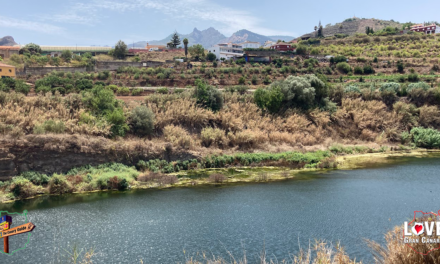March 29, 2021 .- More details have emerged from Operation ‘Avio’, the second major drugs haul to have been carried out in recent days in waters near to Gran Canaria and The Canary Islands archipelago.
- Three crew members were detained on a fishing vessel, flying the Panamanian flag, following a four month long investigation by Customs Surveillance agents who suspected the vessel was being used to transport drugs
- The interception was carried out by a patrol boat, the ‘Sacre’, based in Las Palmas, following previous analysis work carried out by the Customs Surveillance Office for Maritime Intelligence in Galicia
- Operation ‘Avio’ forms part of the larger maritime intelligence operation ‘Nautilus’ promoted last year by the Customs Surveillance Service
 The Spanish Tax Agency performed a daring intervention in the waters of the Atlantic, south of the Canary Islands, boarding a fishing vessel flying the Panamanian flag and carrying about 18,000 kilos of hashish, detaining its three crew members, all of Ukrainian nationality. The boarding from the patrol boat, the ‘Sacre’, by agents of the Customs Surveillance Service, based in Las Palmas de Gran Canaria, completed the exploitation phase of the operation, named ‘Avio’, on Saturday morning. This was the culmination of preliminary follow-up and analysis work carried out over the last four months by the Office of Maritime Intelligence (OIM), part of Customs Surveillance, in Galicia.
The Spanish Tax Agency performed a daring intervention in the waters of the Atlantic, south of the Canary Islands, boarding a fishing vessel flying the Panamanian flag and carrying about 18,000 kilos of hashish, detaining its three crew members, all of Ukrainian nationality. The boarding from the patrol boat, the ‘Sacre’, by agents of the Customs Surveillance Service, based in Las Palmas de Gran Canaria, completed the exploitation phase of the operation, named ‘Avio’, on Saturday morning. This was the culmination of preliminary follow-up and analysis work carried out over the last four months by the Office of Maritime Intelligence (OIM), part of Customs Surveillance, in Galicia.
 Operational action began last Friday and ended in the early hours of the morning of the 27th with the interception of a fishing vessel, named ‘Albatros Guard VSL’, some 170 nautical miles southwest of the island of Gran Canaria, as it was sailing through International waters. A significant number of hashish bales were seized on board the vessel, which, pending official count and weight, could exceed 18 metric tons.
Operational action began last Friday and ended in the early hours of the morning of the 27th with the interception of a fishing vessel, named ‘Albatros Guard VSL’, some 170 nautical miles southwest of the island of Gran Canaria, as it was sailing through International waters. A significant number of hashish bales were seized on board the vessel, which, pending official count and weight, could exceed 18 metric tons.
The seized fishing trawler, under armed guard, arrived yesterday afternoon at the Las Palmas Naval Base to bring the detainees and the drugs to justice. The operation was carried out under coordination of the Special Anti-Drug Prosecutor’s Office of Spain’s National Court and the Central Investigating Court No. 6.
The investigation, developed by the regional Customs Surveillance teams in Galicia and the Canary Islands, with the collaboration of the Centre for Maritime Analysis and Operations (MAOC-N), the Intelligence Centre against Terrorism and Organised Crime (CITCO) and the the French National Intelligence and Customs Investigations Directorate (DNRED). The operation and investigations currently remain open.
Operation ‘Avio’ 315 km south of Gran CanariaAgents of Operation Avio not only carried out a daring operation on the high seas, they also, on their way to their target, rescued a boat full of migrants.
Posted by TheCanary.TV on Monday, March 29, 2021
Customs Surveillance agents who carried out the boarding of the vessel moving 18 tons of hashish, unloaded this Monday on Gran Canaria, became unexpected rescuers when they happened upon 17 migrant women, 4 children and 16 men, accidentally finding their boat while on their way to their mission.
The crew the “Sacre”, whose objective was 315 kilometres south of the archipelago, just by chance discovered with “a boat full of people calling for help” about 273 kilometres from the islands on Friday, and alerted Salvamento Marítimo, according to Carmen Guillén, special delegate of the Tax Agency in the Canary Islands.
Maritime Rescue, “quickly sent an aircraft and a boat to rescue them and we stayed, as instructed, by the side of the boat until they came to save them,” he said.
The mission gained greater significance “apart from capturing a ship with ‘bad guys’ and a lot of drugs, we helped save those people who were in the boat and who we think had also been lost and aimless for several days”, and among which there were “a lot of women and children,” Guillén concluded.
The head of the Tax Agency in the Canary Islands reports that the migrant boat, assisted by the Customs Surveillance agents, was finally rescued by the vessel Guardamar Concepción Arenal, which disembarked the 37 individuals who were aboard, 16 men, 17 women and 4 children, at the Arguineguín dock on Saturday afternoon.
Suspicions about the ‘Albatross’
 The investigation began when aerial means from Customs Surveillance in Galicia detected the transit of the vessel through Galician coastal waters, heading south, the 23-metre-long fishing vessel had set sail from the port of Den Oever in the Netherlands on December 7, 2020.
The investigation began when aerial means from Customs Surveillance in Galicia detected the transit of the vessel through Galician coastal waters, heading south, the 23-metre-long fishing vessel had set sail from the port of Den Oever in the Netherlands on December 7, 2020.
Investigations subsequently carried out by analysts from the Office of Regional Customs Surveillance Maritime Intelligence in Galicia made it possible to identify the ship as suspicious due to various characteristics such as its age, its recent sale and purchase and one particular red flag due to the absence of fishing gear that indicated fishing might not be their main activity. All of this led to the vessel being considered of special risk and it was put under controlled surveillance by the IOM in Galicia and the Canary Islands, as well as by the Central Customs Surveillance Services in Madrid.
The maritime intelligence monitored the target over the following months, which culminated in the planning of the operation, from Las Palmas, for its boarding and interception, which was completed on Saturday.
 The antecedent of the ‘Giant’ operation and the ‘Nautilus’ device
The antecedent of the ‘Giant’ operation and the ‘Nautilus’ device
Nautilus is a newly developed deep analysis anti-drugs operation in the Canary Islands, following the apprehension of a ‘Cyklo 1’ tugboat at the end of last year, as part of operation ‘Gigante’, where a large quantity of hashish was seized, also totalling around 18,000 kilos.
Both operations form part of the ‘Nautilus’ deployment, a national project planned by the Spanish Tax Agency’s Deputy Directorate of Customs Surveillance as part of the primary Action Plans for the years 2020-2021 with the objective to uncover maritime intelligence aimed at detecting possibly suspicious vessels, and initiating corresponding investigations for the repression of illicit drug trafficking by sea and the dismantling of criminal organisations responsible.
Customs Surveillance Service Maritime Intelligence Offices play a decisive role, having been created in 2018 and put inti operation the following year, with key parts in both the ‘Gigante’ and ‘Avio’ operations, and a previous operation ‘Schooner’ which last September led to the simultaneous boarding of four sailboats belonging to the same organisation using Air Naval Customs Surveillance deployments to sieze 35 tons of hashish.
The Annual Tax and Customs Control Plan for the year 2021 relies on the IOM in the strategy for the Customs and Excise Department of the Tax Agency in the fight against drug trafficking on the high seas.













